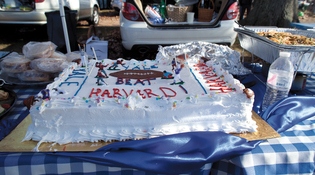 loading
loading
featuresTo change tailgating, change footballIf athletes were less segregated, students would go watch the games.
Mark Oppenheimer ’96, ’03PhD, writes the Beliefs column for the New York Times and directs the Yale Journalism Initiative.  Mark OstowThe aesthetics of tailgating: A "Beat Harvard" cake helped some fans get into the spirit. View full image
Extreme cases make bad law, so I am not ready to draw any conclusions about whether Yale should fix or end the tailgating ritual (especially because it is still unclear what happened to cause that poor woman’s death). But I do wonder if the drinking and recklessness at student tailgates have increased as Yale’s football prowess has lessened. Not because Yale plays poor football, but because its games are so meaningless. Students know that in the world of college football, beating Harvard is not much of a trophy. So they stay outside and drink. Meanwhile, even as the Yale football team has gotten less nationally competitive, the players have become a subculture separate from the rest of the school, self-segregated in fraternities and off-campus housing. Fifty years ago, we had the best of both worlds: a strong team, and a campus culture in which the players were typical Yalies, many of them well-rounded types who played other sports in other seasons, too. Now we have the worst of both worlds: a relatively mediocre team whose players would not likely be at Yale but for their football prowess. I believe in sports as a vital element of campus culture and of the balanced life: my father, as it happens, was a varsity soccer player at Yale, Class of 1967. But I believe we need to return to a small-college model, in which our athletes are not so different, academically, from our non-athletes; in which it is possible to play two or three seasons of different sports; in which walk-ons stand a stronger chance of making the team. Such a model would better integrate sports into the lives of all Yale students. The athletes would be more likely to live in the residential colleges and form friendships with flute players and Political Union types—and those friends would be likely to attend games. And more students would arrive at Yale thinking they might go out for a team. Our football team would, of course, win fewer games. But the average student’s relationship to Yale athletics would be that of an enthusiastic fan, or even a hopeful participant, rather than—as it stands now—an annual binge drinker.
The comment period has expired.
|
|